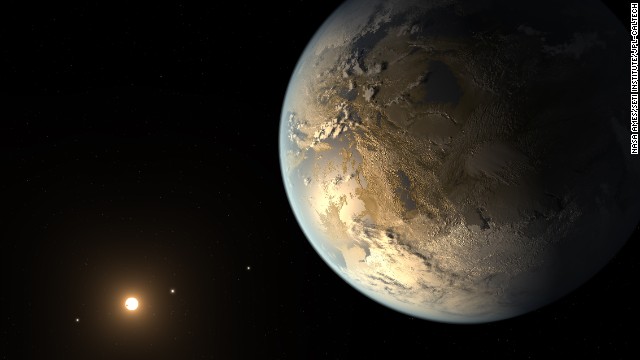Science
Related: About this forumScientists: We're 'Very Close' To Finding Another Earth - CNN
Scientists: We're 'very close' to finding another EarthBy Suzanne Presto, CNN
updated 2:16 PM EDT, Tue July 15, 2014

A team of astronomers announced April 17, 2014, that they have discovered the first Earth-size planet orbiting a star in the so-called "habitable zone" -- the distance from a star where liquid water might pool on the surface. That doesn't mean this planet has life on it, says Thomas Barclay, a scientist at the Bay Area Environmental Research Institute at Ames and a co-author of a paper on the planet, called Kepler-186f. He says the planet can be thought of as an "Earth-cousin rather than an Earth-twin. It has many properties that resemble Earth." The planet was discovered by NASA's Kepler Space Telescope. It's located about 500 light-years from Earth in the constellation Cygnus. The picture above is an artist's concept of what it might look like.
<snip>
(CNN) -- Scientists looking for signs of life in the universe -- as well as another planet like our own -- are a lot closer to their goal than people realize.
That was the consensus of a panel on the search for life in the universe held at NASA headquarters Monday in Washington. The discussion focused not only on the philosophical question of whether we're alone in the universe but also on the technological advances made in an effort to answer that question.
"We believe we're very, very close in terms of technology and science to actually finding the other Earth and our chance to find signs of life on another world," said Sara Seager, a MacArthur Fellow and professor of planetary science and physics at the Massachusetts Institute of Technology.
"Finding Earth's twin, that's kind of the holy grail," said John Grunsfeld, an astronaut who helped repair the Hubble Space Telescope in 2009 and is now an associate administrator at NASA.
Strides in the search for life.
"We already know that our galaxy has at least 100 billion planets, and we didn't know that five years ago," said Matt Mountain, director of the Space Telescope Science Institute in Maryland.
He credited the work of the Kepler Space Telescope for these new discoveries. The planet-hunting Kepler probe, launched in 2009, finds planets by looking for dips in the brightness of a star as a planet transits, or crosses, in front of that star.
Kepler also found the first Earth-size planet that orbits in a star's habitable zone, the area around a star where a planet could exist with liquid water on its surface.
<snip>
More: http://www.cnn.com/2014/07/14/tech/nasa-search-for-life/index.html?hpt=hp_c4
Champion Jack
(5,378 posts)Warren DeMontague
(80,708 posts)but maybe that counts.
randys1
(16,286 posts)Oh no, cant be...that would mean we are not unique or special at all!
longship
(40,416 posts)An earth sized planet orbiting a Sol sized star in an earth-sized orbit would take over three years to detect with Kepler's technique. There just was not enough time to complete much of that mission before it failed.
Still, there is still a lot of unanalyzed Kepler data in the queue. But it takes time for verification with much larger, expensive, land-based telescopes. We'll undoubtedly be hearing about this for years to come.
MFM008
(19,808 posts)so they can blast anything we send there out of the sky.
Warren DeMontague
(80,708 posts)They're perfectly safe from us, don't worry.
This is a pretty silly sentiment IMO.
MuseRider
(34,108 posts)This is always the first thing I think of when I hear this stuff. https://en.wikipedia.org/wiki/The_Wump_World
EDIT to add link in body
Warren DeMontague
(80,708 posts)HUMANS SUCK WUR GONNA DESTROY EVERYTHING OH NO SAVE THEM FROM US WHY CAN'T WE JUST LEAVE WEL ENUF ALONE AND ALL DIE WARGHLLL BARGLE SCIENCE BAD
even if we find another Earth we're not going there to "ruin" it any time soon, people. Educate yourselves about the actual size of the universe- we're a speck on a flea on the ass of another flea speck. And all the other flea ass specks are VERY far away.
Our importance is greatly exaggerated in our own minds AND that includes our ability to "fuck up everything".
Sheesh.
xfundy
(5,105 posts)shoot them there and explode them.
Warren DeMontague
(80,708 posts)given that the fastest objects the human race has created, the voyager probes, would take 70,000 years to reach Alpha Centauri at current speeds, and they're not even heading in that direction.
Edited to add: IF putting trash into space were a cost-effective way to deal with it- it's not- then sending it into the sun would make a fuckton more sense.
jeff47
(26,549 posts)And if we dumped our radioactive waste at the sun, it would become radioactive!!!
( ![]() )
)
Warren DeMontague
(80,708 posts)Javaman
(62,528 posts)SummerSnow
(12,608 posts)defacto7
(13,485 posts)Nice to hear this again. We know what the probability is already and there is only so much elation one can have hearing this message... again. And it's great we have Kepler. It's a great tool.
Now let's have some real results please, a solid hit. That's what I want to hear.